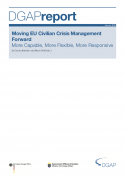The EU has recognized that today’s problems arising from conflicts and instability cannot be solved by individual member states. Instead, EU member states have taken measures to react to old and new security challenges with one voice – for example, by taking a common position on the Iran nuclear deal and prioritizing political engagement in the conflict in Ukraine.
Member states share the understanding that they must strengthen EU policies and instruments to rise to the many challenges. Military means can freeze conflicts and thereby provide space for negotiations, but they cannot create sustainable security. Therefore, in the present security environment, civilian crisis management is more needed than ever before. After member states strengthened the EU military cooperation in 2017, civilian crisis management ranked high on the political agenda in 2018.
Currently, the EU maintains ten civilian crisis management missions in its Eastern neighborhood, the Middle East, the Sahel and at the Horn of Africa with about 2,000 staff. Experts are carrying out wide-ranging tasks such as strategic advice, monitoring, capacity-building and policing. In the field, missions cooperate and coordinate with six EU military CSDP missions, Commission programs, member state embassies, an Article 28 Action, and many more EU instruments and programs. Furthermore, they also interact with other national and international actors such as civil society, host governments, the UN or the African Union. To strengthen this EU-integrated approach to conflicts and crises, all instruments must be fit for purpose – including civilian Common Security and Defence Policy (CSDP) and other civilian instruments.
In November 2017, EU member states began a political process to strengthen civilian CSDP for new security challenges and to renew political and resource commitments.1 The first step to this end was to launch a new concept for civilian CSDP. In the second step, the European External Action Service (EEAS) drafted a Civilian Capability Development Plan, analyzing capability gaps and needs in current civilian missions and pointing out suggestions for further capability development in member states. The process culminated in the adoption of a Civilian Compact in November 2018 – which could be the start of an important push for the whole of EU civilian crisis management.
From 24-26 October 2018, the Federal Foreign Office of Germany, the Swedish Ministry for Foreign Affairs and the German Council on Foreign Relations (DGAP) hosted the conference “Moving Civilian Crisis Management Forward” at Schwielowsee near Potsdam, Germany. It brought together all relevant stakeholders to discuss pressing issues and challenges ahead of EU civilian crisis management, and in particular, civilian CSDP.
The conference results will provide relevant inputs for the EU member states who sealed the ambitious Compact. This initiative marks the beginning of a crucial process to make civilian crisis management fit for future challenges. Following the start of its implementation in 2019, significant work remains for the next years. DGAP and its project team on civilian CSDP will remain committed to support the further process through research and expert gatherings. We are looking forward to the next steps toward a further professionalization of civilian CSDP.
Dr. Christian Mölling

